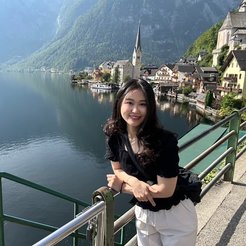Minerva’s daughters want to change the world
Dr. Jinsun Lee from South Korea is working as a postdoc at the MPI für Kohlenforschung
Writing scientific papers was a challenge for her initially, but Dr. Jinsun Lee has fought her way through and is now successfully forging her own path as a chemist. In this interview, the young South Korean woman also talks about why her father is a particular role model for her.

Dr. Jinsun Lee works as a postdoc in the research group of Dr. Harun Tüysüz. In this interview, the young woman from South Korea explains what brought her to Mülheim an der Ruhr and what she finds so fascinating about heterogeneous catalysis in particular.
What brought you here? Tell us about your way to the Kohlenforschung!
Jinsun Lee: During my PhD in South Korea, my research focused on heterogeneous catalysis, specifically nanomaterials to single atom catalysts, exploring artificial photosynthesis and electrolysis for sustainability. I became more passionate about this field due to its urgent potential as an alternative to fossil fuels, addressing the growing global energy demand. I was particularly drawn to the world-renowned work in heterogeneous catalysis conducted at Kolenforschung, and I am eager to collaborate with intelligent scientists in a stimulating environment that fosters innovation and progress in this critical area.
What do you like about your work?
Jinsun: What I like about my work is the friendly working atmosphere and the support from my colleagues, who are always willing to help. The presence of a world-class analytical department is also a significant advantage. Whenever I need to discuss results or data, I can easily collaborate with experts, leading to quick and precise interpretations, which is crucial in advancing scientific research. This collaborative environment greatly enhances the efficiency and quality of my work.
What are your professional goals?
Jinsun: My professional goal is to pursue a long-term career as a material scientist in academia, where I can continue contributing to scientific progress and the well-being of society. I will develop cutting-edge technologies that address the world’s growing energy needs while mitigating the harmful effects of fossil fuel use on the environment, particularly in global warming.
What has been your most difficult step so far?
Jinsun: Achieving my PhD degree and writing my first paper in South Korea was a significant challenge. To fulfill the requirements for my PhD, I had to publish several papers and complete multiple projects, which caused a lot of mental strain due to time constraints and the stress of ongoing work. Writing my first paper was particularly difficult because I had no prior experience with academic writing. I struggled to maintain my own narrative and stay focused on my story. I reached out to many senior colleagues for guidance and faced numerous challenges with reviewers. Despite the difficulties, the experience taught me valuable lessons in academic writing.
Do you have a role model?
Jinsun: In my life, my father is my role model. He worked for the same company for over 33 years and even after retirement, his work ethic continues to inspire me. He is incredibly diligent, and I’ve always admired how he maintained a consistent routine, waking up at the same time every day. Growing up, I realized how challenging it is to establish such a routine, and how much it positively impacts daily life. Inspired by him, I am now trying to create my own routines, though I find it’s not easy to implement consistently.
What advice would you give to young girls who are interested in working in a scientific institution?
Jinsun: To young girls interested in working in a scientific institution, I would say that while the path in science can be challenging, it is incredibly rewarding. There is still a noticeable lack of female scientists, but once you discover the beauty and excitement of scientific discovery, it can transform your life. Don't be discouraged by obstacles; instead, embrace the journey. You have the potential to contribute significantly to the field and help shape its future.
If you had one wish: What would it be?
Jinsun: If I had one wish, it would be for more opportunities and funding for early-career scientists. Due to the current economic challenges, many of us face difficulty securing positions and advancing in our careers without sufficient financial support. This issue is widespread and affects many in the scientific community.












